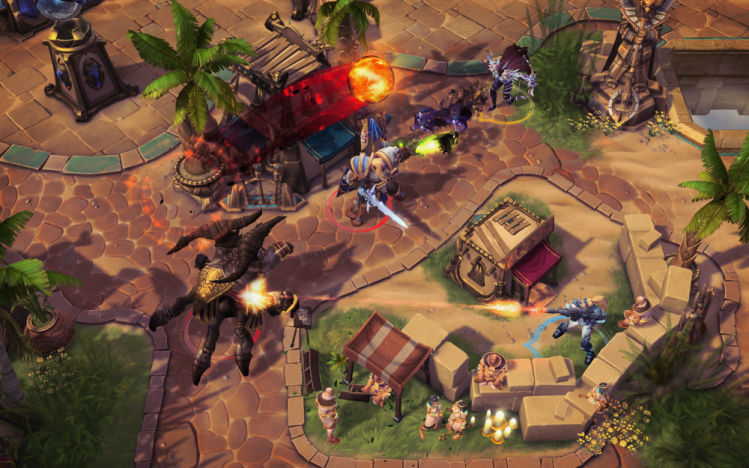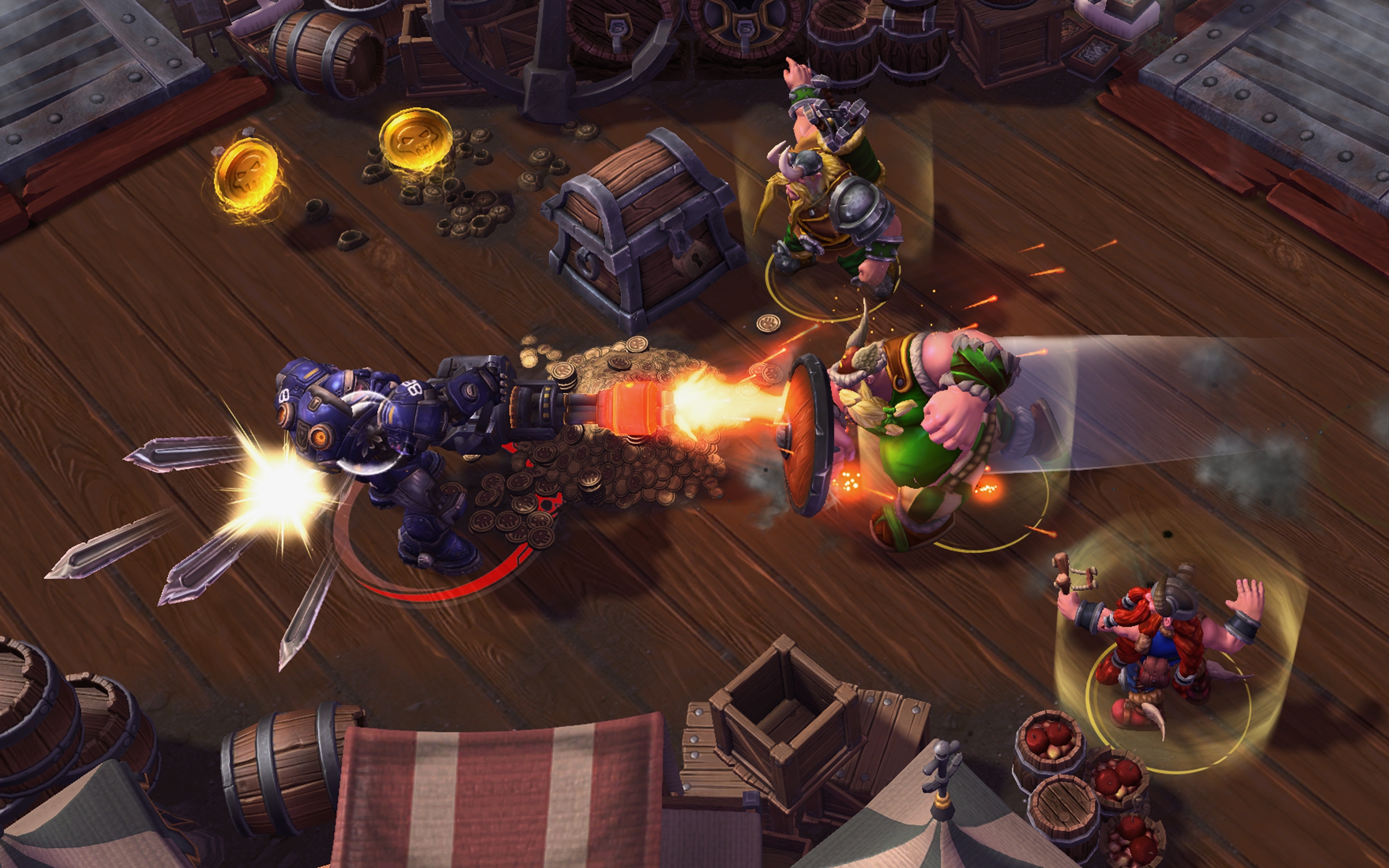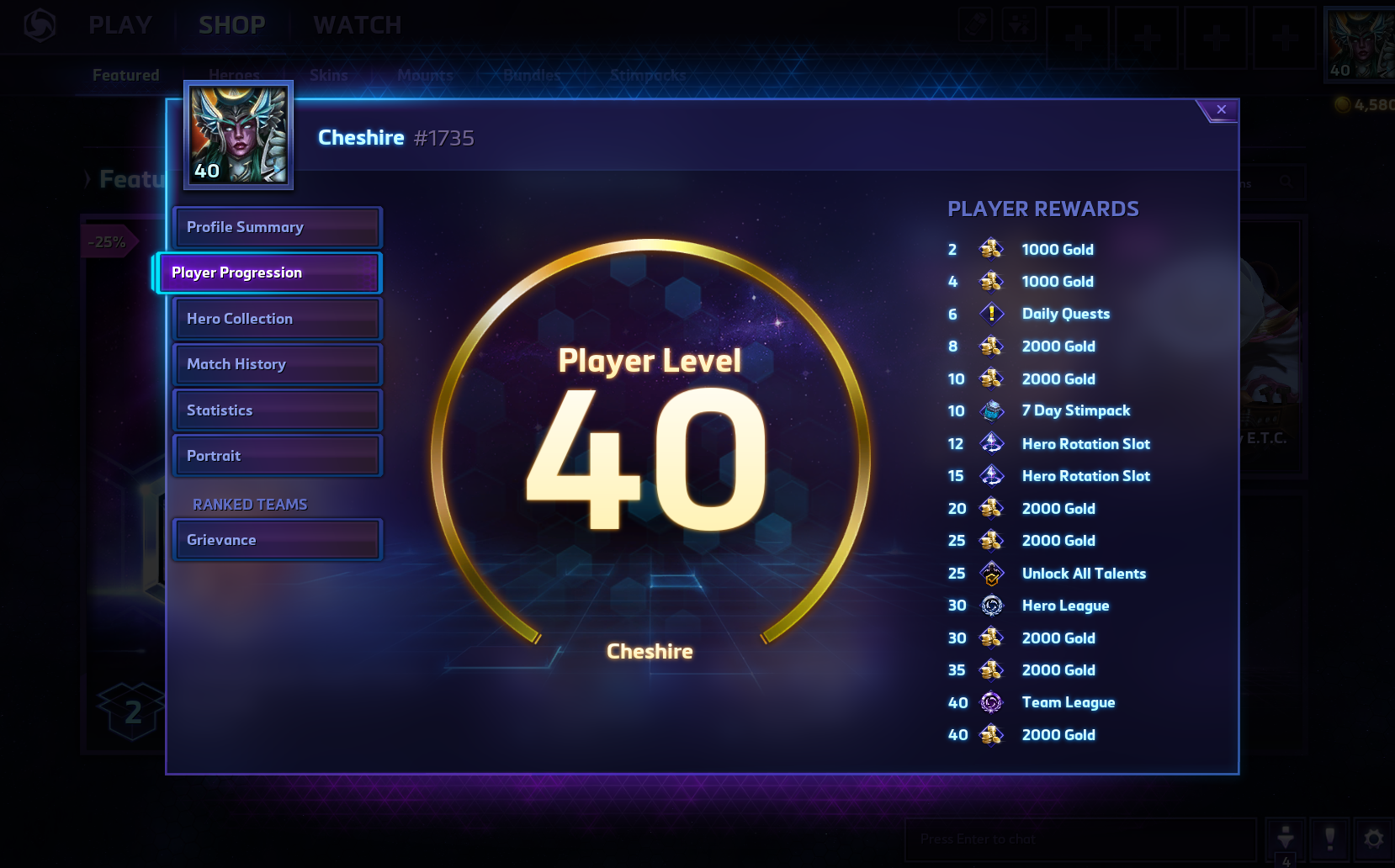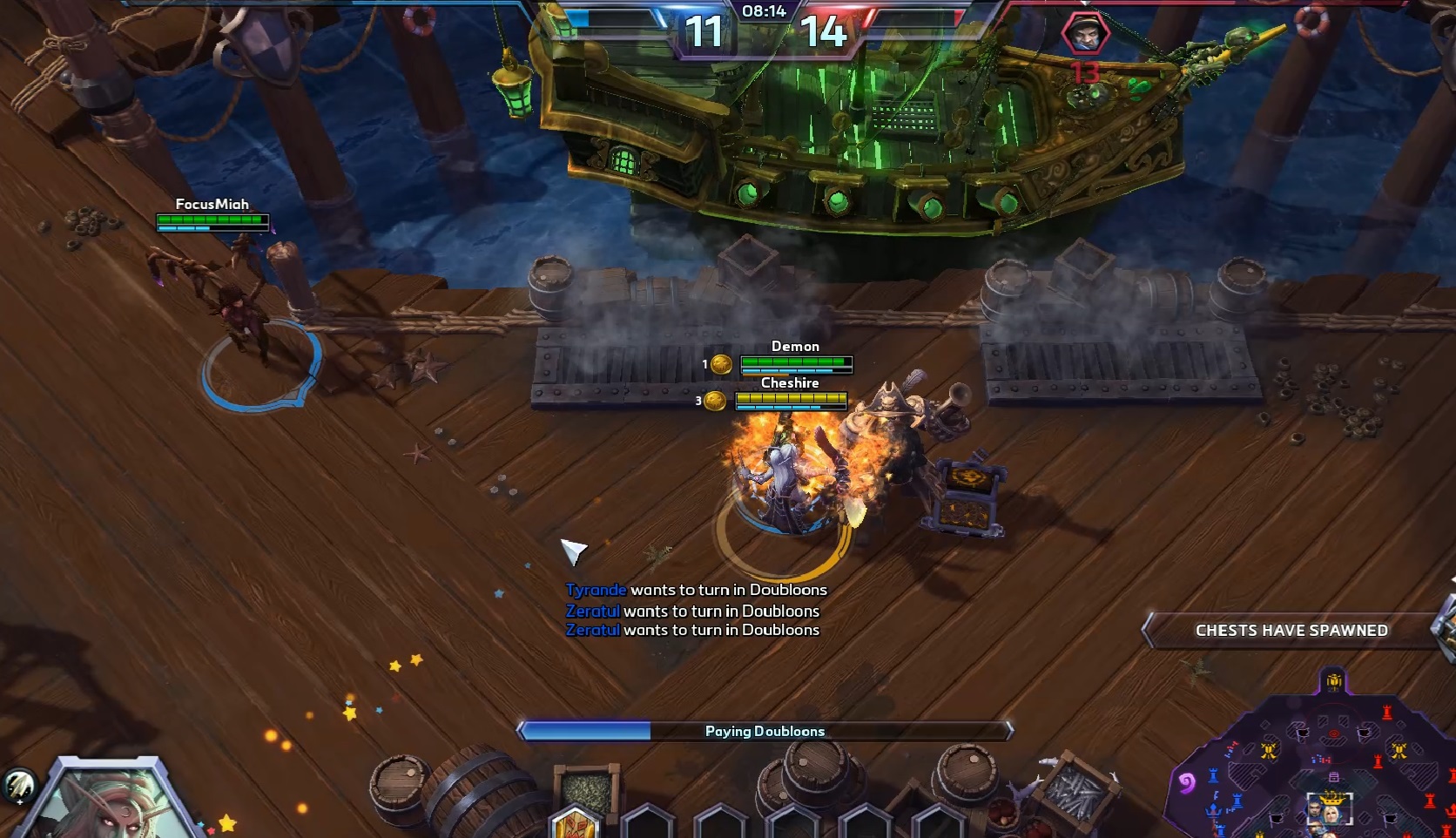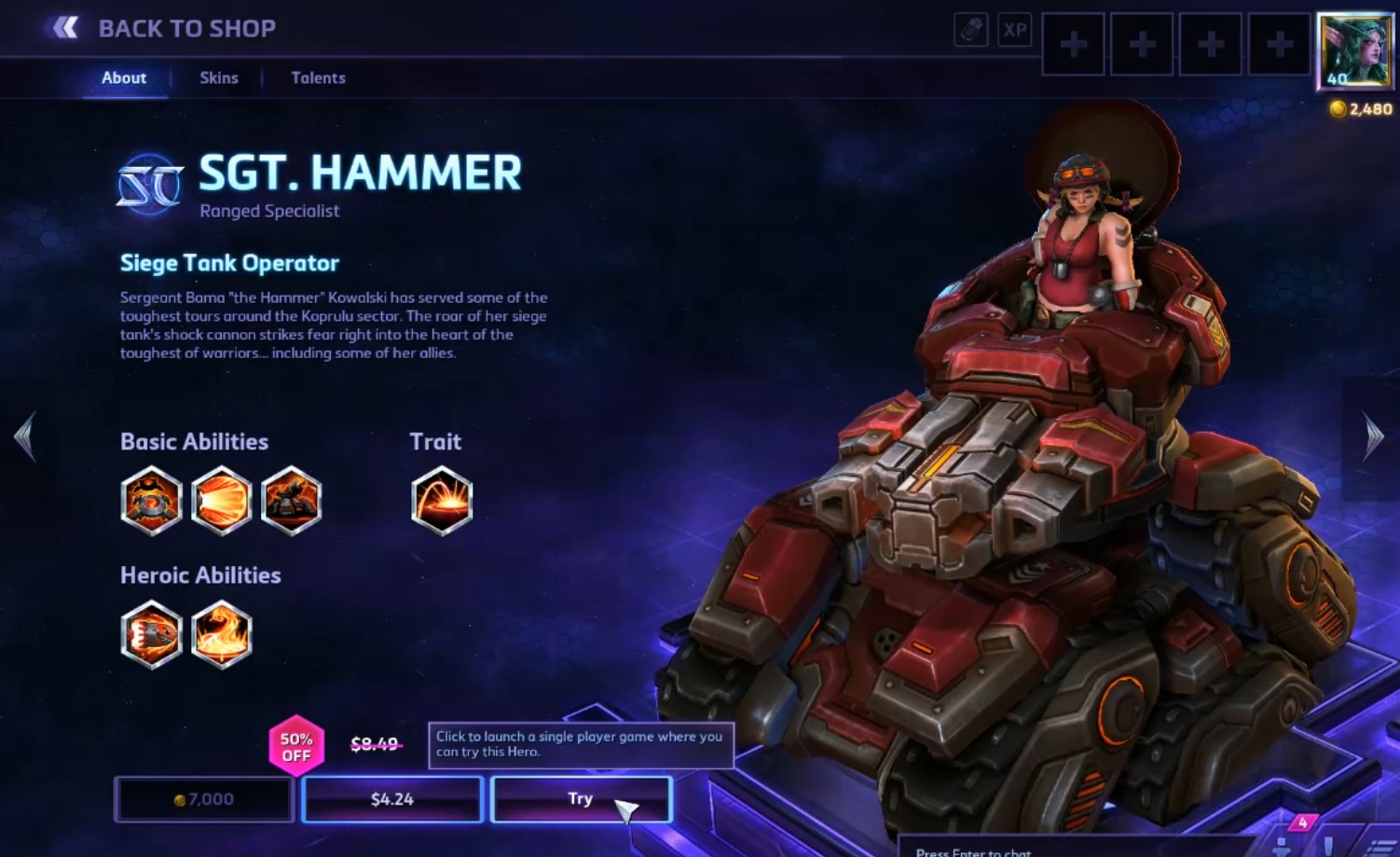Check out our Reviews Vault for past game reviews.
Part of me feels a little bad for Blizzard, since it’s only now releasing a game in a style it hand a hand in creating. But another part of me thinks Blizzard isn’t too broken up about it.
Like its direct competitors, League of Legends and Dota 2, Heroes of the Storm is multiplayer online battle arena (MOBA, a genre that’s sprung from the Defense of the Ancients mod from Warcraft 3), but it’s infused with Blizzard’s unique ability to distill complicated concepts into simple forms. Its objective is simple: Two teams have a huge building on their side of the map, and it’s your job to destroy your enemy’s. You do this by destroying the walls, towers, cannons, and structures around it. The enemy team’s characters (called heroes) don’t want that, and will try to stop you. The genre is usually too complicated for your average player to get into, but Blizzard has managed to create the simplest, least intimidating entry in the genre yet.
It’s also a lot of fun.
What you’ll like
It finally makes MOBAs approachable
Dota 2 might be my favorite game of all time. I’ve played it for over 2,400 hours, more than the rest of my Steam library combined. But outside of a few friends with a passing interest I’ve managed to convert, I can’t recommend it to anyone without ample free time. It’s too intricate. What hero should a newbie play (it has quite a few)? What skills or items should I build (it depends on a number of things)? What goes through spell immunity (you can consult a list, but not in-game).
Heroes of the Storm is a lot like Dota 2 (and League of Legends), but it makes the nuances of MOBAs easier to understand.This may sound strange to someone who’s never played these kinds of games before, but it’s liberating to not have to think about what kind of damage each hero’s spell deals, which global skills and talent trees to equip before a match, what spells to put point points into first, or what items to buy. There’s no gold, only experience, which you get simply from being around enemy minions, defenses and heroes when they go down.
Each map has different objectives (more on that later), but they’re clear, and because they’re so important to winning, you won’t easily forget them. What sounds complex in text is a lot simpler in practice; pick one of the heroes available for free that week, enter a match, read the rules, and attack towers. After a few minutes and a couple of training matches, you’ll fall into the rhythms of the game, faster than in any other big MOBA. Heroes eases you in slowly but has less to teach you, and you could learn to play it between back-to-back World of Warcraft raids, if you’re that thoroughly entrenched in Blizzard’s ecosystem.
This simplicity is HotS’ biggest strength. It’s not dense. And while that may seem attractive to diehards of other games, it should appeal to just about anyone else who’s played a game with an isometric perspective. And as three-year Dota 2 vet, I found it a nice change.
It emphasizes teamwork more than other MOBAs
Heroes of the Storm wants players to work as a team. This may sound obvious for a 5-on-5 squad-based game, but you’d be surprised. Other MOBAs thrive on highs and lows, with one of the lows being getting worked over by a single player who outclasses everyone else on the opposing side. You’ll find those players in just about any multiplayer game, but everything about Heroes points toward strength through synergy over individual glory.
Every member on your team shares the same level, so any kill on a minion, tower, or hero makes everyone stronger. The interface also shares both teams’ levels, making it easier to know when you should bide your time and play it safe and when to push after a favorable skirmish. “Kills” and “assists” don’t exist in Heroes, only “Takedowns,” which aggregate both. The scoreboard displays stats for damage done on heroes and towers, but it also shows damage healed as well as how much experience everyone’s contributed. These stats make it harder for a player on a losing team to find someone to blame for the loss. It encourages every player to think of themselves as part of a team instead of someone forced to play with one, which is a chronic problem in other MOBAs.
This causes people to think about the game differently, and the various map objectives drive the point home. Each of the game’s six maps has a team objective that takes places over the course of a match, whether it’s collecting gold for a pirate, entering the mines for skulls, or fighting for the right have someone on your team become a dragon. You can stay in your lane and gather experience for a little while, but if you don’t engage with objectives, nine times out of ten you’ll lose. Objectives often involving staying in particular areas of the map for extended period of time, and these areas inevitably spawn the most fights. Win these fights, and you’ll have a huge advantage going forward.
This emphasis on teamwork makes it easier for anyone starting out to learn how to play without feeling like someone’s breathing down their neck, watching their every move and waiting to point out each mistake. It may still happen, but everything Blizzard does to wean people off individual play means most players will focus less on numbers and more on winning the game.
(Hint: To find out which role or character is right for you, read our guide to picking your role in every popular MOBA).
It just wants you to have fun
Newbies will find a lot of love in Heroes of the Storm, and it’s because Blizzard wants players to have fun (and then buy stuff). Hardcore players will eventually find their way into the hero and team leagues, which offer more competitive ranked play, where picking heroes choices are more important. Generally, the barrier to entry is lower than in Dota 2 or League of Legends, the learning curve is flatter, and it has all the hooks of modern multiplayer games that appeal to people who just want to have a good time.
As you play matches and level up your overall and hero levels, you’ll unlock nonessential items to equip, as well as in-game gold to buy heroes with (this is a free-to-play game, after all). You can see what you’ll get for every milestone, which makes it easy to settle into the “one more game” mentality and play for night after night. It also helps that games are about half as long as the average MOBA, meaning you don’t have to commit to playing for an hour at a time.
You’ll also get new, daily “quests” once you reach level six (which won’t take long), which will encourage you to play a particular kind of hero or to just keep playing by awarding more in-game currency. Other games would hand these bonuses out only if you played against other people, but since Heroes just wants you to keep playing, you can play against computer opponents and still reap the rewards. Skill is always an important factor most MOBAs want to teach you so you’ll keep coming back, but if you just like the way the game plays and want the feel of sweet unlocks, that’s fine too.
It doesn’t take itself too seriously
Heroes of the Storm is the Marvel Vs. Capcom of MOBAs. It has little regard for why any of its events are happening, but it cares a lot about individual characters. Heroes who have some relationship in their respective games will quip with each other, and you’ll see hundreds of callbacks to Diablo, Starcraft, Warcraft in the skills, aspects, and unlockable skins of each character.
But as much as Heroes respects the lore of Blizzard’s franchises, it will also abandon it for the sake of a good gag. Abathur in a onesie, sucking on a pacifier? Why not? Nova as a roller-derby girl? Sure. Coming from Dota 2, where all kinds of user-submitted sets are rejected because they don’t match the lore Valve trickles out every once in a while, it’s great to see a company have fun with it. The crossover aspect gives the whole experience a sort of goofy air, and if anyone can embed a serious game with goofiness, it’s Blizzard.
What you won’t like
The pricing structure
As fun as those outfits are, they’re expensive. They’re in line with what many free-to-play games expect you pay for similar items, and “whales” will be whales, but that doesn’t make them better. Twenty dollars for a rainbow unicorn is a rough deal, made even worse by the game requiring you to buy any hero you want play regularly or grind gold by playing matches to buy them later.
Weekly rotations are a great way to get players to try new heroes regularly, but so is having them all available from the start. Dota 2 does this, and it still rakes in big money from whales, though they do it by having a drop-based system wherein you can spend $20 and still not get the one rare item you wanted. It’s a pick-your-poison scenario, I suppose, but it doesn’t make any of these methods less sleazy. I have to imagine there’s a middle ground somewhere.
The exorbitant prices rub up against Heroes ’ “just have fun” mentality when you can no longer play as a hero you were having fun with, try to find the best way to buy them, then realize buying every hero will cost you about $300. Some heroes cost more than others (novice-friendly Raynor runs for a fiver, and he gets cheaper when you buy him in a bundle), but realizing how much they’ll have to spend (in terms of time or money) to get everything they want could turn prospective players away.
It’s a little behind on features
Heroes of the Storm’s approach to teamwork — that is, to make it more central than in any other game before it — is great, but it doesn’t fully commit. The biggest fault here is the lack of voice chat. I can see where Blizzard’s coming from (being berated by a teammate is worse when you can hear them, and most groups of friends will probably end up using a Mumble or Teamspeak server), but I don’t agree with its stance. Since you can mute players, you should only hear a bad comment once and be done with it. Typing instructions or suggestions is too slow for a game this fast.
I could understand the lack of voice if the ping system was more robust, but as it is, I found it lacking. You can ping four messages on a single point, and pinging objectives will tell allies you’d like to tackle them instead of trying to push down enemy defenses. However, you can’t ping a number of other things, such as your own health (to indicate you won’t be able to help in a fight because you’re low on health) or whether or important spells are on cooldown (meaning you want to wait until you can use them). Other MOBAs have only recently gotten these features, but they also had voice chat long before then.
You also can’t spectate other people’s games in the client, which is a problem for someone trying to learn the game by watching top players. Watching others play games you’re interested in learning is the best way to pick up new strategies, unlearn bad ones, and learn how certain builds beget different playstyles. Of all the features Heores is missing, this is the one I’d like to see added most, because it turn the game into more than something you play, which is the lifeblood of any game attempting to enter the wily world of esports.
Fighting a tidal wave isn’t fun
Heroes of the Storm’s commitment to teamplay has a downside. With the way it handles leveling and the enormous importance of each map’s objectives, losing can often mean getting absolutely crushed. A small advantage in experience in the early game leads to a fight won, leads to an objective taken leads to another fight won, and so on. When you get rolled in Heroes, it can feel like fighting a tidal wave. And the collective experience means you know just how badly you’re losing. In all the matches I’ve played so far, I’ve never beaten or lost a lead greater than about three levels. Once a team gets a good start, it’s hard to stop it.
The most enjoyable matches in Heroes are often a thrill ride, where instead of a tidal wave you have a heavy sloshing back-and-forth in which the team who won the last fight has the biggest advantage. This is anathema to other MOBAs (since having only the last moments of a game matter can be frustrating after building up a lead), but with how fast the games in Heroes are, it’s the way to go, and Blizzard could probably do with adding a few elements to encourage big comebacks. It may not be the most proper idea of balance, but if Heroes wants to maintain its fun-over-serious nature, it will have to start thinking more creatively than it already has.
Conclusion
I don’t think I’ll end up switching to Heroes of the Storm long-term. But what makes the game good is that I don’t have to. Rather than abandon it altogether, I can return to it whenever I’m stuck in rut with whatever other multiplayer game I’m fiending at the time, get a couple of fun, intense games in, then go about my day. That it doesn’t require as much investment is in many ways is in many ways antithetical to the genre, but for the many people who still haven’t found their place in gaming’s “big thing” right now, Heroes of the Storm could very well be what they’re looking for.
Score: 80/100
GamesBeat played the game during the alpha, beta, and release iterations, but the reviewer used their own money for microtransactions since they plan on playing the game occasionally going forward and feel using anything they didn’t pay for wouldn’t be fair to other players.
VentureBeat's mission is to be a digital town square for technical decision-makers to gain knowledge about transformative enterprise technology and transact. Learn More
